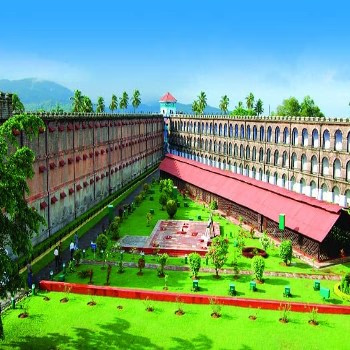Cellular Jail
The Cellular Jail, also known as Kala Pani, is a historic colonial-era prison located in Port Blair, the capital city of the Andaman and Nicobar Islands, India. It holds immense historical significance as it was used by the British colonial government to exile political prisoners, particularly freedom fighters from India, during the struggle for independence. Built between 1896 and 1906, the Cellular Jail was designed as a panopticon-style prison with seven wings radiating from a central watchtower. The prison was constructed in a way that each cell was isolated from the others, earning it the name "Cellular Jail." The architecture of the jail was intended to instill a sense of isolation and despair among the inmates. The Cellular Jail gained notoriety for the inhumane treatment of its prisoners, who were subjected to harsh conditions, forced labor, and brutal punishments. Many notable freedom fighters, including Veer Savarkar, Batukeshwar Dutt, and Yogendra Shukla, were imprisoned in the Cellular Jail for their involvement in the Indian independence movement. The jail was used by the British authorities to suppress dissent and quell nationalist movements across India. Prisoners were often subjected to solitary confinement, inadequate food and water, and physical torture. Despite the hardships endured by the inmates, the Cellular Jail became a symbol of resistance and courage during India's struggle for independence. The inmates devised various ways to communicate and maintain their spirits, including secret messages, songs, and cultural performances. Today, the Cellular Jail serves as a national memorial and museum, dedicated to the memory of the freedom fighters who were incarcerated there. The museum showcases exhibits and artifacts related to the history of the Cellular Jail, the Indian independence movement, and the lives of the prisoners. Visitors to the Cellular Jail can explore the various wings of the prison, including the solitary confinement cells, the central watchtower, and the gallows where prisoners were executed. Light and sound shows are also organized in the evenings, narrating the history of the Cellular Jail and the sacrifices made by the freedom fighters. Overall, the Cellular Jail stands as a somber reminder of India's colonial past and the sacrifices made by those who fought for the country's independence. It is a significant historical landmark and a place of reverence for visitors seeking to learn about India's freedom struggle.
